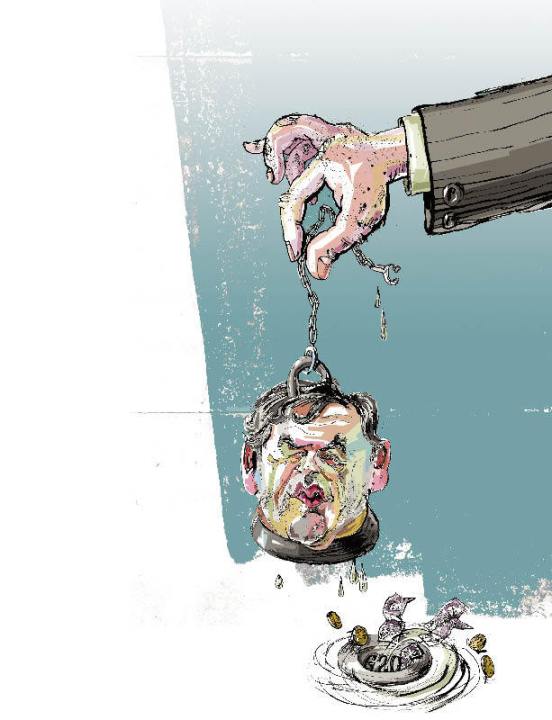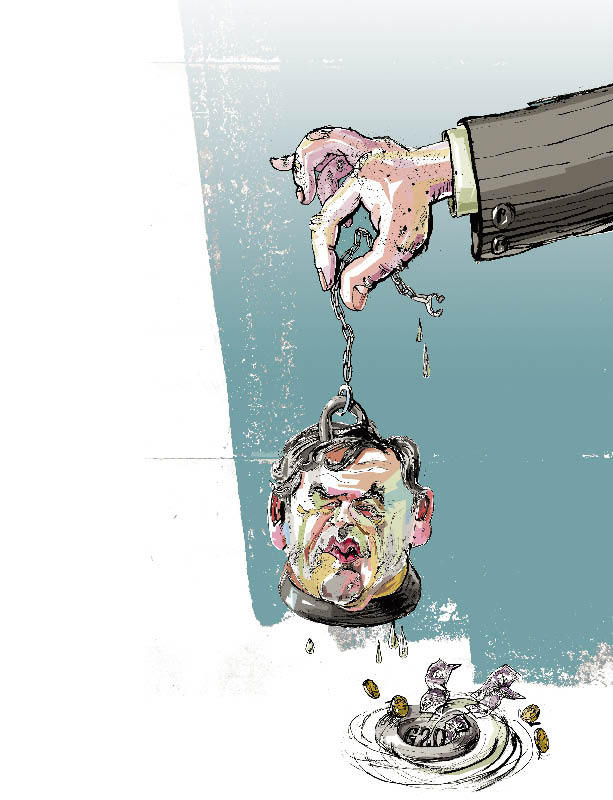Ross Clark looks ahead to Gordon Brown’s summit at which he will try to revive his own political fortunes, found a new global economic order and stage a Bretton Woods for our times. No chance: the whole thing is an expensive sham
It is difficult to look at the photographs of the world’s finance ministers, bank chiefs and assorted hangers-on assembled at a hotel in West Sussex last weekend without thinking of those old BT ads with the slogan, ‘Why not change the way we work?’ Has anything come out of the meeting of G20 finance minsters in Horsham, or will come out of the follow-up heads-of-government summit in Docklands on 2 April, which could not have been achieved by phone, email or video-conference? Maybe the world’s leaders should have followed their usual platitudes about looking to the future and engaging the young by holding the whole thing on Facebook instead.
We all know the real reason why 22 world leaders — the presence of Spain and the Netherlands has spoiled the name somewhat — will be trekking to the workaday ExCel Centre a week on Thursday. Gordon Brown wants to create himself a Bretton Woods moment. He wants to pose at the centre of a photograph of men saving the world (and it really will be the men, as Ms Merkel is clearly in no mind to do Gordon’s bidding for him). He wants to thumb his nose at Nicolas Sarkozy and say, look, I got Barack Obama first. Above all, he wants to create the image of himself as a seasoned operator on the international stage and David Cameron as a pipsqueak outsider who can’t be trusted in such turbulent times.
It has become a standard tactic of a leader under pressure at home: go and strut the global political stage. At least at a summit everyone is polite to your face. Gordon can pose as being beyond the narrow world of Westminster — when of course he is focused absolutely on the election which must come within 14 months. The international pose is not guaranteed to work: Mrs Thatcher didn’t do herself any favours by missing an EU summit in Paris on the day of Michael Heseltine’s challenge against her in 1990. But Gordon Brown hasn’t forgotten the sudden fillip in his poll ratings last autumn when he briefly appeared to be leading the world out of the banking crisis.
As for the idea that G20 will provide the seed from which will rise the fabled green shoots of recovery in the global economy, forget it. The script of the heads of government meeting can be written before it begins. Brown and Obama will demand that the world’s other large economies throw ever larger quantities of money at their economies — the US wants everyone to commit to spending 2 per cent of GDP on emergency spending. Ms Merkel will say, ‘Stuff that: it’s your banking crisis that caused all this; I’m not going to throw good German money down the drain.’ Everyone will, however, agree to throw more money at the IMF, though to what exact purpose they won’t be agreed. All leaders will then serve up platitudes about the importance of encouraging free trade at a time like this, before hurrying home to sign yet another bail-out for the restive voters in some rustbelt industry. But before that, the tea will be served and there will be a nice photograph — though not too nice. Country houses had been scouted for the G20 summit, but perhaps realising that the imagery of posing among urns and balustrades wouldn’t have been ideal in the middle of a recession the government opted for the Isle of Dogs instead.
In spite of the spartan surroundings, the G20 will run up a reported bill of £50 million. A bill of £5 million alone will go to the company organising the staging and sound equipment. The enormous security bill will, in a typical piece of Brownomics, appear off-balance sheet — the police have not been granted a specific budget, so resources will have to be switched from other areas. You can be sure that there won’t be time for much other policing in London on 2 April. The presence of so many world leaders in the capital at a time of huge public anger over bank bonuses has already stirred the juices of all manner of protest groups who are threatening to put tens of thousands on the street.
What will we get in return for our money? If the leaders were really to have a meaningful dialogue on everything on the G20 agenda, it would, perhaps, be money well worth spending. But are they really going to hammer out an economic rescue package plus establish a new regulatory framework for the global banking system, wipe out financial crime, work out a free trade deal and lift the Third World out of poverty all in one day? It sounds less like a conference than Monty Python’s Proust Summarization Competition, in which contestants were given 15 seconds to précis A la recherche du temps perdu.
A good amount of the time, needless to say, will go on arguing about the precise wording of the communiqué. Let’s examine what the document produced at Horsham said. Clause number four includes this pearl:
Is there anyone else out there wondering how ordinary citizens are supposed to cope with the concept of an ‘unconventional policy instrument’? I would love to think it meant the defenestration of Alistair Darling, if not the flaying of the Governor of the Bank of England. Cross-textural analysis with the Bank of England’s recent output, however, suggests it means quantitative easing, which of course is itself a polite way of saying creating money out of thin air. The passage in the G20 communiqué therefore revolves around a euphemism of a euphemism. It is the classic output of a committee: words crafted to avoid causing offence, and in the process leaving most people in the dark.
The above passage is at least vaguely honest: central banks really are printing money. It is a different case with this promise: ‘We commit to fight all forms of protectionism and maintain open trade and investment.’ How can any US government official seriously sign up to such a statement when Obama has just pushed through a rescue package obliging government departments to buy American? How can France sign it when it has not the least intention of opening up European food markets to free competition? How could Darling sign up for it when he has just bailed out the motor industry with public cash? Much as they try to make out otherwise, governments cannot help themselves trying to win short-term popularity by withdrawing into protectionism.
But nothing made me laugh in the Horsham communiqué so much as the commitment to expanding the role of the IMF, and the suggestion that it hold an ‘early warning exercise’ to warn of future financial instability. The IMF already carries out early warning exercises. Lots of them, in fact. In December 2003, for example, it warned Gordon Brown, then chancellor, to stop borrowing or risk losing control of the public finances. In March 2004 it said that the Bank of England must raise interest rates to rein in the property boom or risk a painful bust in the housing market in future. The Bank of England put rates up once more but then stalled, before cutting rates, stimulating the last mad rush of the property boom in the process. This was not entirely the Bank of England’s fault: it was by 2004 prevented from setting interest rates to control the housing market. The previous year, in the middle of a housing boom, Brown removed house prices from the official inflation index.
Alistair Darling now wants the IMF to take on the role of watchdog for international banks. Maybe it should, but there is already a body which was supposed to be monitoring the activities of banks operating in the City of London. It is called the Financial Services Authority and it is costing British taxpayers one third of a billion pounds a year — including a salary of £660,000 to its chief executive. Mr Darling might better spend his time asking why this body ha s failed so comprehensively in what it is supposed to be doing, and putting it right. It is hard to avoid the conclusion that by trying to offload the business of monitoring banks on to an international agency, Mr Darling is hoping to distract from the failure of his own government’s regulatory bodies.
What, by the way, happened to the banking regulatory system which G20 members promised to set up in the communiqué issued at the end of the last emergency summit, in Washington in November? Listed among the ‘immediate actions’ to be undertaken by 31 March 2009 was a promise to set up ‘supervisory colleges’ to monitor the activities of international financial institutions. Banks, according to the communiqué, were supposed to ‘meet regularly with their supervisory college for comprehensive discussions of the firm’s activities and assessment of the risks it faces’. Admittedly there is still a week left but has anyone yet spotted the bosses of Lloyds and RBS trouping off to a meeting with their ‘supervisory college’? I did contact the Treasury press office to ask what progress had been made on this issue, but at the time of going to press I had received no answer.
Since the G20 doesn’t have a hope of getting through its ambitious agenda in a day, might it drop an item or two? There is one thing begging to be left off until another time, yet for some reason I have a suspicion it is the item about which Gordon Brown cares most. It is the subject of tax havens. Brown — and this is one subject on which he does find common ground with Angela Merkel — wants to close them down. He wants their banks to be forced to reveal information on their depositors. Fair enough, where the aim is to trace criminal activity. But why try to stitch up the rules at what is supposed to be a crisis meeting for the global economy and to which the tax haven nations have not even been invited? There are no prizes for guessing why: Brown knows full well that the dire state of the public finances will require taxes to be raised sharply after the election — way beyond the new 45 per cent upper rate of income tax which has already been announced — and that it will create a flight of wealthy citizens to tax havens.
That is the essence of G20. It is about big countries using their might to exclude small, inconvenient ones from international business. Forget the talk of free trade: after building up huge deficits to bail out their economies, the last thing big countries will want is competition from small nations with low tax rates. We’ve had G7, G8 and now G20. Next time how about a G193 — the number of independent nations recognised by the United Nations? If we are going to create a new global economic order, the Cayman Islands has every right to a say.
Or, on reflection, wouldn’t it be better just to cancel the whole thing?








Comments